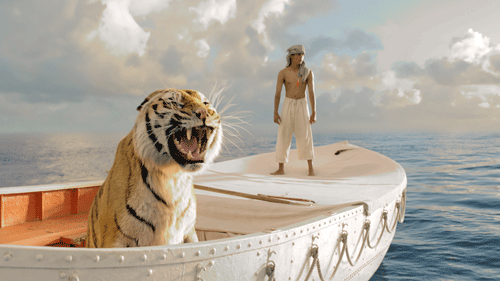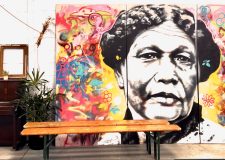Steve Callahan – The real Life Of Pi adventurer

Steve Callahan talks to Latest 7 about his involvement with 3D motion picture Life Of Pi and how it pivoted on his own amazing life experiences
Steve Callahan is famously noted for spending 76 days adrift on the Atlantic ocean in a small lifeboat, forced into learning survival techniques in order to stay alive. When he eventually made it back to land, he turned his experiences into the New York Times best-seller ‘Adrift’. Twenty years on, after being mentioned in fantasy novel Life of Pi by Yann Martel, Callahan’s life experiences have become the centre point to the new cutting edge 3D motion picture film Life of Pi, turning what was thought to be ‘unfilmable’ into an audacious and powerful performance.
“Some people go to church. I go to sea.”
Many have felt a true sense of the world when confronted with the raw and natural beauty of the ocean, but few have experienced it the way Steve Callahan has. In 1982 he was cast adrift in the Atlantic Ocean in a small dingy for a shocking 76 days.
He turned his experiences into a book, Adrift, which became a New York Times best seller. Fast forward nearly 20 years and author Yann Martel mentions Callahan in his best-selling fantasy adventure novel Life of Pi, which explores issues of spirituality as it follows the survival of a shipwrecked Indian boy, stranded in the Pacific Ocean with a Bengal Tiger for 227 days.
Naturally, with Ang Lee set to bring Life of Pi to the big screen, it was a perfect fit for the director to bring Callahan to set and take him on as official Survival and Marine Consultant.
“Ang Lee tracked me down and we really hit it off,” says the survivor, writer, sailor and philosopher from his home in Maine, New England. “I was hired as the survival consultant, but ended up doing things with a lot of different departments. As the script consultant said, ‘You’ve got your fingerprints all over this film.’”
He’s got plenty of his stories in it too, Lee riveted enough by the details – the way he’d prepare a meal, how a giant blue whale and its baby emerged by his raft – to recreate them for Pi. Striving for authenticity, the director lapped up Steve’s anecdotes and relied heavily on his expertise.
“I mapped out what the ocean and sky might look like and matched it with the storyline,” he says. “I stayed throughout principal shooting, spent time with Suraj (Sharma, who plays Pi Patel), discussed the psychological issues and got involved with props. Plus I was endlessly experimenting with the wave tank – it was a continual learning process, but I think in the end we got some stuff that looked pretty realistic.”
Of course, for Steve it inevitably brought back many disturbing memories of his journey two decades ago. As a young man, the ocean was already in his blood; he was sailing 25-footers single handedly before he got out of high school, and he taught himself celestial navigation – the art of using angular measurements between the sun, the moon, a planet or a star and the horizon to guide you. He was soon focused on spending as much time as possible out at sea.
“I remember it feeling womb-like, and looking out at the sea passing by and it just felt like home,” he says. “I think it’s a very Zen-like experience – I feel very humbled there in a way that really moves me. The ocean has become kind of my universal metaphor for everything.
We have this perception in human society that everything is solid and fixed and we try to make things predictable but everything is really fluid.”
If Callahan sounds like a philosopher, it’s because he is: at university he studied Philosophy and the Arts, and absolutely sees the connection between his studies and his passion.
“To me a boat is a pretty amazing human creation because it’s part vehicle, part home and part art,” he says. “I was always interested in philosophy and ideas, the human side imposed on the natural world, but I just didn’t realize how important the human side was until I was drifting around in a life raft. As much as I love the natural world, I’m also attached to the human side of things, which is trying to figure it out. Which ties in to Life of Pi and what Ang was trying to do with the movie… from his point of view, the major theme of the movie is the importance of story in our lives.”
The big story in Callahan’s life came in 1982. His marriage of six years had fallen apart and he decided to fulfill a life-long dream: to cross the ocean in a small, humble boat.
“I wanted to show that you could live a minimalist material lifestyle and yet reach every place,” he says. “So I designed this little boat, built it and took off from the States. The big game was to get to England, which I did fine. But I was broke and had nothing really to come back to so I figured I’d go to the Caribbean and get a job in a boat yard.”
That’s when disaster struck. About a week into his journey it started blowing hard, and he hunkered down.
“Then something BOOM! hit the boat and a whole bunch of water came rushing in,” he says. “I just knew immediately that she was doomed and I’d better get my ass out of here or I’m going down with it. I got into the life raft and it got broken away from the boat, basically in the middle of the Atlantic. I spent the next two and a half months learning to live like an aquatic caveman.”
His raft had a canopy that offered a little protection from the sun, and he had a ‘ditch kit’ – basic survival equipment, like a sleeping bag, a piece of foam, and some solar stills, a device produced during the Second World War for pilots to distill freshwater from saltwater. However, mental and physical survival requires more than the basics; he had to go through what psychologists commonly refer to as ‘the stages of survival’.
“They divide the survival experience up in a wide variety of ways,” he says. “First there’s Pre-Impact – which is how well adapted are you to what you’re doing, how well prepared are you for something going wrong, how much in denial are you? Then there’s the Impact stage, when the action actually happens and it’s a matter of escaping that and getting out of that immediate threat. Then there’s this Recoil stage where everything is new and you have no idea what to do. Finally there’s the Adaptation stage, which is when you’ve figured out your systems – you make tools and you learn how to live off the environment.”
For ocean survivors they have to wait a little while for an ocean ecology to start to develop – barnacles and weeds growing on the raft. Soon these attract little fish, which themselves attract bigger fish.
“So I had an island ecology,” he laughs. “I had ‘Rubber Ducky’, as I named it, my little island. So I lived in and was the Mayor of Ducky-Ville.”
As mayor and sole inhabitant, he got first choice of the food, which mainly consisted of Dorado, a form of mahi-mahi commonly found in tropical waters.
“They’re fairly big fish, so I would eat organ meats right away because they would go bad,” he says. “But the flesh I could actually strip up in one-inch square cross-sections, and I would string those up to dry in the sun. So in essence it’s kind of like cooking it.”
He was also able to produce about a pint a day of fresh water using the solar stills – “ the average person could arguably live about a month without food, but you can only live about 10 days without water, so without them I wouldn’t be alive today,” he says. Whether fishing with a spear, making water, or keeping his mind occupied, he knew survival had to be a pro-active pursuit.
“This idea that you can lay around and someone’s going to come and pick you up is not a good approach,” he says. “For the Adaptation stage, it’s important to normalize life as much as possible. Humor’s a big part of that, and it’s work work work – getting up in the morning, navigating, exercise, keeping a log, fishing, doing repairs… just being proactive. I had my little stock of fish, little sip of water, I’d watch the sun go down through the canopy and was like ‘Ah, this is the way life should be!’ You go through the same emotions and the same ups and downs as in normal life; it’s just all on steroids.”
Finally, he saw the pulse of a lighthouse, knew land was close by, and heard the engines of a local fishing boat, initially attracted to the school of Dorado circling his own private eco-system. Seventy-six days after setting sail, he came aground on the island of Marie-Gallante, just off the coast of Guadeloupe.
“When I got ashore I had physically lost about a third of my weight and was covered with all these saltwater sores,” he says. “I was pretty with it, but physically I couldn’t stand up because of extreme sea legs, so I just kind of collapsed on the beach.”
One thing he’s certain of, his survival story didn’t end then: in many ways, it was just the beginning.
“Most people end it when your feet hit the shore, but it’s actually only the start,” he says.
“The post-survival is a whole kind of survival experience of its own – it was a whirlwind for a while, and then I had re-integrate with family and friends. I was delivered this experience, which meant a huge amount to me, and it was a spiritual experience. As I rode in the life raft, some of the stuff I saw and witnessed I could never have seen or experienced any other way – they were incredibly powerful and often incredibly beautiful – as well as incredibly horrible.
I saw my relationship to the Universe and clarified what I believed, especially in my relationship with people. I realized out there that I really missed people, whether they were a pain in the ass or not, that I really needed them in my life and to become a more active member of society. I was determined to come back and be a better person.”
He’s gained enormous strength through his experience, something he’s still calling on today. Steve was recently diagnosed with Leukemia, and he’s using everything he learned out there in the Atlantic to guide himself through yet another test of survival.
“When I received the bad news about my health, the nurse commented that most people would be like deer caught in the headlights,” he says. “But for me it was more like, ‘Oh, okay, here’s something I’ve got to deal with.’ Like out on the ocean, I’m looking for ways to adapt.”
Steve continues to adapt to everything that’s thrown at him with a strength he found cast adrift in Ducky-Ville. Despite all the ups and downs that came from his experience, he wouldn’t have had it any other way.
“Life doesn’t go away; risks don’t go away,” he says. “There are people who try and hide from risk, minimize risk in their life, but for me I don’t think there’s anything riskier.”
Life Of Pi is in cinemas Thursday 20 December.
Win Life Of Pi film merchandise




















